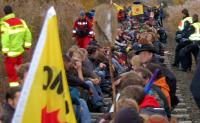On Saturday 6 November the 12th Castor transport from France to Gorleben was scheduled to pass the German-French border in Berg, Rhineland-Palatinate state. More than 2,000 anti-nuclear activists assembled to demonstrate. Many were willing to blockade the CASTOR train to send a clear message against nuclear power. The blockade was successful. The CASTOR consignment was blocked and forced to take another route. It's the first time so many people awaited the CASTORS with a distinct blockade in south-west Germany.
Duration: 6:18 minutes
Pressrelease of soutwestern Anti-Nuclear-Inititives.
Transcription of the video
Narrator: On Saturday the 6th November 2010 the 12th Castor transport was scheduled to pass the German-French border in Berg Rhineland-Palatinate. More than 2,000 anti-nuclear activists assembled to demonstrate, many willing to blockade the waste train to send a clear message against nuclear power.
Activist I: I'm here because I'm against nuclear electricity. I also oppose the politicians' eyewash.
Activist II: I have demonstrated against nuclear power plants since the early 80ss. Hundreds of thousands demonstrated against Brokdorf. Again and again: But nothing changed. In Wyhl a nuclear power plant was prevented because of the people’s resistance. I'm a doctor. The risks of nuclear power are incredible. And the unsolved problem of nuclear waste radiating for hundreds of thousand years. I think it's so unbelievable that you have to demonstrate against it.
Activist III: There is no safe repository, that's why all nuclear power plants have to be shut down.
Activist I: I think it's great that the people demonstrate because what is happening in this country is a shame. During the last years people didn't understand the reasons for the protests. But nowadays the opinion is changing – somehow.
Activist II: The march is going straight ahead, pink and purple divert.
Rail squatter I: I was one of the first. There were few policemen. Every five metres and they told us: “Turn around!” But we just sat down.
Rail squatter II: We just arrived at the rails nearly without any problems.
Rail squatter III: It's always a sign when many stand up. I think it's pretty important because if no one speaks up it legitimate. At least saying: I oppose.
Rail squatter IV: Yes we are in Berg just behind the German-French border where a nuclear waste transport is supposed to pass. Right now a few hundred, I´d say 5-600 anti-nuclear activists, doing a rail action to interfere the train's passage. The main protests will take place in the Wendland. But we wanted to provide some action for the stay-at-homes. Especially now, seeing that the decisions in Berlin were made to prolong the operating times and to give away tax presents. We decided to welcome the CASTORS here in southern Germany just behind Lauterbourg, just behind the border. It's not ok to wait for the end of nuclear power for more than ten years. The social democratic-green government did not shut down any relevant plants. Now it's supposed to continue for years. The majority of people are not willing to bear this anymore and we wanted to send a signal from the rails. And we succeeded.
Chorus: shut down! shut down! shut down!...
Police spokesman: We stopped eviction, because the eviction is legally not proportional any more. The transport will definitely not pass this point, so we stopped the eviction.
Narrator: The eviction was stopped – a success for the activists. The Castor shipment was blocked and has to take another route. It's the first time so many people awaited the Castors with a distinct blockade in the south-west.

